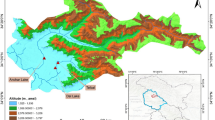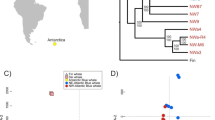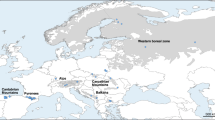Abstract
The Mediterranean green turtle regional management unit is one of the 17 management units of green turtles considered a global conservation priority. However, previous studies using different genetic markers revealed very little diversity and differentiation across populations due to the overdominance of one haplotype (CM-A13) in the Mediterranean. We, therefore, used a more informative marker, mitochondrial short tandem repeats (mtSTRs), in 431 samples collected along the eastern Mediterranean coasts of Turkey and Northern Cyprus. In addition, we added the mtSTR haplotypes of previous studies and reached a total of 980 samples covering 12 nesting beaches (almost 100% of the populations in the region). We identified 42 haplotypes, 4 of which were recorded for the first time in the region. The species has a genetic diversity in the region higher than previously thought, ranging from 0.54 (Sugözü, Turkey) to 0.934 (Israel) and with the most common haplotypes being 6-8-8–4 (26.5%), 6-8-5-4 (17.3%), and 6-8-6-4 (14.9%). The analysis of a more extensive data set of mtSTRs supported recognizing at least three management units in the Mediterranean. Furthermore, we used the new data to assess the origin of the turtles foraging in Israel. We determined that Samandağ (Turkey) was the population of origin of most of the individuals. Overall, we show that mtSTRs highly improve the resolution to detect population structuring and source for this species and region.





Similar content being viewed by others
Data availability
All data needed to evaluate the conclusions of the paper are presented in the paper. Additional data related to this paper may be requested from the authors.
References
Avise JC (1998) The history and purview of phylogeography: a personal reflection. Mol Ecol 7:371–379. https://doi.org/10.1046/j.1365-294x.1998.00391.x
Bagda E, Bardakci F, Turkozan O (2012) Lower genetic structuring in mitochondrial DNA than nuclear DNA among the nesting colonies of green turtles (Chelonia mydas) in the Mediterranean. Biochem Syst Ecol 43:192–199. https://doi.org/10.1016/j.bse.2012.03.015
Bass AL, Epperly SP, Braun-McNeill J (2004) Multi-year analysis of stock composition of a loggerhead turtle (Caretta caretta) foraging habitat using maximum likelihood and Bayesian methods. Conserv Genet 5:783–796
Bauer S, Hoye BJ (2014) Migratory animals couple biodiversity and ecosystem functioning worldwide. Science 344:1242552. https://doi.org/10.1126/science.1242552
Bowen BW, Meylan AB, Ross JP, Limpus CJ, Balazs GH, Avise JC (1992) Global population structure and natural history of the green turtle (Chelonia mydas) in terms of matriarchal phylogeny. Evolution 46:865–881. https://doi.org/10.1111/j.1558-5646.1992.tb00605.x
Bradshaw P, Broderick AC, Carreras C, Igner R, Fuller WJ, Snape R, Godley B (2017) Satellite tracking and stable isotope analysis highlight differential recruitment among foraging areas in green turtles. Mar Ecol Prog Ser 582:201–214. https://doi.org/10.3354/meps12297
Bradshaw PJ, Broderick AC, Carreras C, Fuller W, Snape R, Wright LI, Godley BJ (2018) Defining conservation units with enhanced molecular tools to reveal fine scale structuring among Mediterranean green turtle rookeries. Biol Conserv 222:253–260. https://doi.org/10.1016/j.biocon.2017.12.014
Carreras C, Pascual M, Cardona L, Aguilar A, Margaritoulis D, Rees AF et al (2007) The genetic structure of the loggerhead sea turtle (Caretta caretta) in the Mediterranean as revealed by nuclear and mitochondrial DNA and its conservation implications. Conserv Genet 8:761–775. https://doi.org/10.1007/s10592-006-9224-8
Casale P, Broderick AC, Camiñas JA, Cardona L, Carreras C, Demetropoulos A et al (2018) Mediterranean Sea turtles: current knowledge and priorities for conservation and research. End Species Res 36:229–267. https://doi.org/10.3354/esr00901
Clusa M, Carreras C, Pascual M, Demetropoulos A, Margaritoulis D, Rees AF et al (2013) Mitochondrial DNA reveals Pleistocenic colonisation of the Mediterranean by loggerhead turtles (Caretta caretta). J Exp Mar Biol Ecol 439:15–24. https://doi.org/10.1016/j.jembe.2012.10.011
Encalada SE, Lahanas PN, Bjorndal KA, Bolten AB, Myamoto MM, Bowen BW (1996) Phylogeography and population structure of the Atlantic and Mediterranean green turtle Chelonia mydas: a mitochondrial DNA control region sequence assessment. Mol Ecol 5:473–483. https://doi.org/10.1111/j.1365-294X.1996.tb00340.x
Excoffier L, Lischer H (2010) ARLEQUIN suite ver 3.5: a new series of programs to perform population genetics analyses under linux and windows. Mol Ecol Resour 10:564–567. https://doi.org/10.1111/j.1755-0998.2010.02847.x
Jensen MP, FitzSimmons NN, Dutton PH (2013) Molecular genetics of sea turtles. In: Wyneken J, Lohmann KJ, Musick JA (eds) The biology of sea turtles, vol III. Chemical rubber company press, Boca Raton, pp 135–161
Kivelä M, Arnaud-Haond S, Saramäki J (2015) EDENetworks: a user-friendly software to build and analyse networks in biogeography, ecology and population genetics. Mol Ecol Resour 15:117–122. https://doi.org/10.1111/1755-0998.12290
Komoroske LM, Jensen MP, Stewart K, Shamblin BM, Dutton PH (2017) Advances in the application of genetics in marine turtle biology and conservation. Front Mar Sci 4:156. https://doi.org/10.3389/fmars.2017.00156
Lohmann KJ, Lohmann CMF, Brothers JR, Putman NJ (2013) Natal homing and imprinting in sea turtles. In: Wyneken J, Lohmann KJ, Musick JA (eds) The Biology of Sea Turtles, vol 3. CRC Press, Boca Raton, FL, pp 59–78
Manni F, Guérard E, Heyer E (2004) Geographic patterns of (genetic, morphologic, linguistic) variation: how barriers can be detected by “Monmonier’s algorithm.” Hum Biol 76:173–190
Mazaris AD, Schofield G, Gkazinou C, Almpanidou V, Hays GC (2017) Global sea turtle conservation successes. Sci Adv 3:e1600730. https://doi.org/10.1126/sciadv.1600730
Monzón-Argüello C, Dell’Amico F, Morinière P, Marco A, López-Jurado LF, Hays GC, Scott R, Marsh R, Lee PLM (2012) Lostat sea: genetic, oceanographic and meteorological evidence for storm-forced dispersal. J R Soc Interface 9:1725–1732. https://doi.org/10.1098/rsif.2011.0788
Narum SR (2006) Beyond bonferroni: less conservative analyses for conservation genetics. Conserv Genet 7:783–787. https://doi.org/10.1007/s10592-005-9056-y
Peakall R, Smouse P (2012) GenAlEx 6.5: genetic analysis in excel. Population genetic software for teaching and research– an update. Bioinformatics 28(2537–2):539. https://doi.org/10.1111/j.1471-8286.2005.01155.x
Pella J, Masuda M (2001) Bayesian methods for analysis of stock mixtures from genetic characters. Fish Bull 99:151–167
Seminoff JA (2004) Chelonia mydas. The IUCN red list of threatened species 2004: e.T4615A11037468. https://doi.org/10.2305/IUCN.UK.2004.RLTS.T4615A11037468.en
Shamblin BM, Bagley DA, Ehrhart LM, Desjardin NA, Martin RE, Hart KM et al (2015a) Genetic structure of Florida green turtle rookeries as indicated by mitochondrial DNA control region sequences. Conserv Genet 16:673–685. https://doi.org/10.1007/s10592-014-0692-y
Shamblin BM, Dutton PH, Bjorndal KA, Bolten AB, Naro-Maciel E, Santos AJB, Bellini C, Baptistotte C, Marcovaldi MA, Nairn CJ (2015b) Deeper mitochondrial sequencing reveals cryptic diversity and structure in Brazilian green turtle rookeries. Chel Conserv Biol 14:167–172. https://doi.org/10.2744/CCB-1152.1
Shamblin BM, Bagley DA, Ehrhart LM, Nairn CJ (2015c) Mitochondrial repeat haplotypes suggest local origins for CM-A13 green turtles foraging in Florida. Mar Turtle Newsl 146:11–13
Shamblin BM, Witherington BE, Hirama S, Hardy RF, Nairn CJ (2018) Mixed stock analyses indicate population-scale connectivity effects of active dispersal by surface-pelagic green turtles. Mar Ecol Prog Ser 601:215–226. https://doi.org/10.3354/meps12693
Shamblin BM, Hart KM, Martin KJ, Ceriani SA, Bagley DA, Mansfield KL et al (2020) Green turtle mitochondrial microsatellites indicate finer scale natal homing to isolated islands than to continental nesting sites. Mar Ecol Prog Ser 643:159–171. https://doi.org/10.3354/meps13348
Sönmez B, Türkecan O, Jded A (2017) Long distance movement between nesting sites for two green turtles in the eastern Mediterranean. Mar Turt Newsl 153:7–8
Stokes KL, Fuller WJ, Glen F, Godley BJ, Hodgson DJ, Rhodes KA, Snape RTE, Broderick AC (2014) Detecting green shoots of recovery: the importance of long-term individual-based monitoring of marine turtles. Anim Conserv 17(6):593–602. https://doi.org/10.1111/acv.12128
Thompson JD, Higgins DG, Gibson TJ (1994) CLUSTAL W: Improving the sensitivity of progressive multiple sequence alignment through sequence weighting, position-specific gap penalties and weight matrix choice. Nucleic Acid Res 22:4673–4680
Tikochinski Y, Bendelac R, Barash A, Daya A, Levy Y, Friedmann A (2012) Mitochondrial DNA STR analysis as a tool for studying the green sea turtle (Chelonia mydas) populations: the Mediterranean Sea case study. Mar Genomics 6:17–24. https://doi.org/10.1016/j.margen.2012.01.002
Tikochinski Y, Bradshaw P, Mastrogiacomo A, Broderick A, Daya A, Demetropoulos A et al (2018) Mitochondrial DNA short tandem repeats unveil hidden population structuring and migration routes of an endangered marine turtle. Aquat Conserv Mar Freshw Ecosyst. https://doi.org/10.1002/aqc.2908
Tikochinski Y, Carreras C, Tikochinski G, Vilaça ST (2020) Population-specific signatures of intra-individual mitochondrial DNA heteroplasmy and their potential evolutionary advantages. Sci Rep 10(1):211. https://doi.org/10.1038/s41598-019-56918-6
Türkozan O, Yılmaz C, Uçar AH, Carreras C, Ergene S, Aymak C, Karaman S (2018) Local differentiation in the origin of stranded loggerhead turtles, Caretta caretta, within an eastern Turkey foraging area. Ocean Coast Manage 153:70–75. https://doi.org/10.1016/j.ocecoaman.2017.12.011
Turkozan O, Yakup K (2010) Turkey. In: Calase P, Margaritoulis D (eds) Sea Turtles in the Mediterranean: Distribution, Threats and Conservation Priorities. IUCN, Gland, Switzerland, pp 257–293
Van der Zee JP, Christianen MJA, Bérubé M, Nava M, Schut K, Humber F, Alfaro-Núñez A, Becking LE, Palsbøll P (2021) The population genomic structure of green turtles (Chelonia mydas) suggests a warm water corridor for tropical marine fauna between the Atlantic and Indian oceans during the last glacial. Heredity 127:510–521. https://doi.org/10.1038/s41437-021-00475-0
Wallace BP, DiMatteo AD, Hurley BJ, Finkbeiner EM, Bolten AB et al (2010) Regional Management units for marine turtles: a novel framework for prioritizing conservation and research across multiple scales. PLoS ONE 5(12):e15465. https://doi.org/10.1371/journal.pone.0015465
Warnes GR, Bolker B, Bonebakker L, Gentleman R, Liaw WHA, Lumley T et al (2016) gplots: various R programming tools for plotting data. http://CRAN.R-project.org/package=gplots. Accessed 14 May 2021
Yilmaz C, Turkozan O, Bardakci F (2011) Genetic structure of loggerhead turtle (Caretta caretta) populations in Turkey. Biochem Systemat Ecol 39(2011):266–276. https://doi.org/10.1016/j.bse.2011.08.018
Acknowledgements
The authors would like to thank anonymous reviewers and the editor for their constructive comments which improved the manuscript.
Funding
This study is financially supported by The Scientific and Technological Research Council of Turkey (TUBITAK) with project code 117Z996. Carlos Carreras is supported by the Spanish Government projects’ CTM2017‐88080 (MCIN/AEI/10.13039/501100011033 and by ERDF “A way of making Europe” of the European Union), the project PID2020-118550RB (MCIN/AEI/10.13039/501100011033) and is a member of the research group SGR2017-1120 (Catalan Government).
Author information
Authors and Affiliations
Contributions
SK: formal analysis, investigation, data curation, methodology, and writing original draft. OT: conceptualization, methodology, validation, resources, writing original draft, writing—review editing, visualization, supervision, project administration, and funding acquisition. CC: formal analysis, writing original draft, writing—review editing. CY: investigation, resources, writing original draft. BS: investigation, resources, and writing original draft. OC: investigation, resources, and writing original draft. SE: investigation and resources, ME: investigation and resources. AHU: investigation and resources, CU: conceptualization, methodology, validation, resources, data curation, writing original draft, supervision, project administration, funding acquisition, and writing—review editing.
Corresponding author
Ethics declarations
Conflict of interest
The authors have no relevant conflicts of interest to declare.
Ethical approval
All applicable international guidelines for sampling, care, and experimental use of organisms for the study were followed and all necessary approvals were obtained.
Consent for publication
The authors guarantee that the MS has not been previously published elsewhere, or that if it has been published in whole or in part, any permission necessary to publish it.
Consent to participate
The author declares that any person named as co-author of the contribution is aware of the fact and has agreed to being so named.
Additional information
Responsible Editor: C. Eizaguirre.
Publisher's Note
Springer Nature remains neutral with regard to jurisdictional claims in published maps and institutional affiliations.
Supplementary Information
Below is the link to the electronic supplementary material.
Rights and permissions
About this article
Cite this article
Karaman, S., Turkozan, O., Carreras, C. et al. Population genetic diversity of green turtles, Chelonia mydas, in the Mediterranean revisited. Mar Biol 169, 77 (2022). https://doi.org/10.1007/s00227-022-04068-1
Received:
Accepted:
Published:
DOI: https://doi.org/10.1007/s00227-022-04068-1




